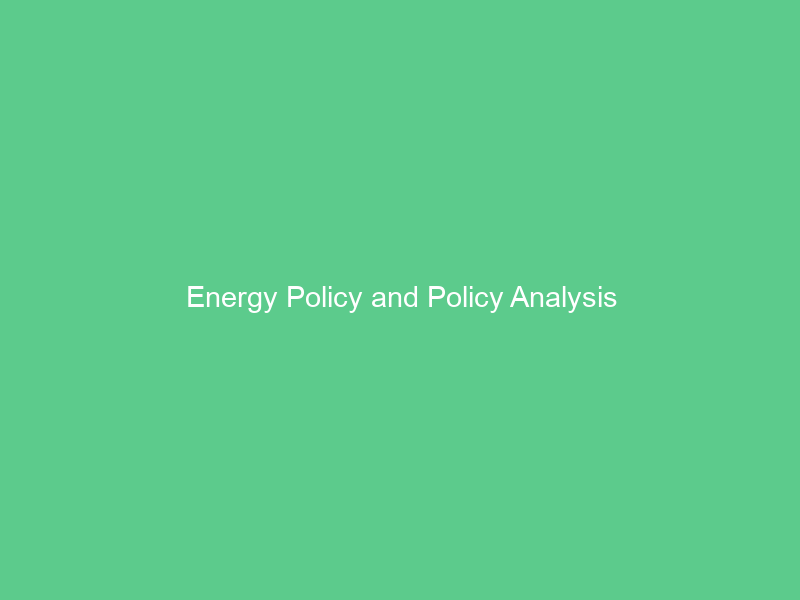Energy policy provides the foundation for an eco-friendly and efficient energy sector. Different nations take different approaches when adopting their national energy policies based on national interests and goals such as decarbonization, system reliability, resource diversification, technology export potential or electricity access.
Consumers must be enabled to benefit from low carbon technologies without incurring unnecessary barriers or costs, which makes effective governance during the net zero transition of codes and technical rules essential.
Policy Analysis
Policy analysis involves the practice of examining policies to determine their efficacy and impact, taking into account applicable laws and regulations as well as an understanding of how different stakeholders will react to a given policy. Policy evaluation also involves identifying potential trade-offs or risks for each policy option being studied.
An effective low carbon economy and society is one of the key challenges governments must meet this century, necessitating radical transformation across all aspects of economic activity as well as decarbonisation efforts in energy. To do this, drastic transformation will need to occur across all areas and deep decarbonisation strategies are required in energy.
Economic policy analysis requires taking into account four features: complexity, non-economic aspects, uncertainty and stakeholder engagement. This paper shows how qualitative scenario development is an effective foresight approach which meets these requirements and applies it to an economic policy study of gas infrastructure modifications involving hydrogen capture and storage technologies in Germany. Six qualitative sociotechnical scenarios were also developed within this case study and briefly presented.
Policy Development
Citizens can engage in energy policy-making in various ways. One effective approach is supporting industry associations that reflect issues they care most about – for instance those advocating renewable and clean energy sources, net zero buildings or other policies.
Policy-makers often face pressure from stakeholders with various interests, including economic development, geopolitical security, climate action and rapid deployment of new technology. Political science provides valuable insight into why each group of stakeholders’ ability to exert influence differs.
National level governmental bodies typically assume the role of policy development, including setting goals and prioritizing initiatives. Following policy development, these are then implemented either by departments or independent bodies and periodically evaluated depending on national requirements – providing opportunities to realign with changing national or global goals, respond to new research findings or meet public sentiment responses, thereby helping ensure energy policies remain sustainable over time.
Policy Implementation
National policy makers create and implement various energy policies. Their decisions are informed by multiple interests such as economic development, geopolitical security, climate action, rapid deployment of new technology as well as various capacities of stakeholders to influence decision makers and hold them accountable for their actions.
OECD nations vary significantly in how they set policy goals, target implementation plans and evaluate results. Qualitative Content Analysis (QCA), the assessment method selected for this research project, provides an effective means of exploring these differences and the repercussions they may have for sustainability outcomes.
Interviewees reported that SEMARNAT’s Consultative Council for Energy Transition represented an important step toward better integration between climate and energy policy (interviews 2, 9 and 18), although its scope limited only to information dissemination and collaboration on data and emission factors.
Policy Evaluation
Policy evaluation is an integral component of program administration, helping identify short, medium and long term results and pinpointing needs for change in implementation and monitoring processes. Evaluation may occur either during design (to compare cost-benefit analyses of various policies) or throughout implementation or at completion (in order to gauge long-term impacts).
This review examined the methods utilized to assess energy policy effectiveness. As expected, numerous methodologies were found across documents; less frequently employed approaches included utilization-focused or theory-driven evaluation approaches.
Emphasis was placed on finding attributes and metrics that could be used to assess policy effectiveness as opposed to just efficacy or efficiency, leading to the identification of core categories for more comprehensive assessments: Institutional, Environmental, Economic and Social.

